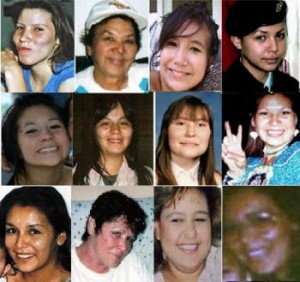by Greg Macdougall – originally published on rabble.ca
 Today, October 4, is the seventh annual day of Sisters in Spirit vigils to honour the lives of the too many missing and murdered Aboriginal women and girls in Canada.
Today, October 4, is the seventh annual day of Sisters in Spirit vigils to honour the lives of the too many missing and murdered Aboriginal women and girls in Canada.
There are at least 156 vigils scheduled across Canada for 2012, with a few more in the United States, Mexico and Bolivia.
The problem is a national tragedy and crisis, states Native Women’s Association of Canada (NWAC) president Michèle Audette. NWAC’s Sisters in Spirit (SIS) research had documented 582 cases before the SIS program funding and name was cut by the federal government in 2010.
And the number is likely much higher. “Even though we have that number, they only relied on secondary sources to get that information … Very competent staff, but they were relying only on media reports that existed already, they relied on police files that were public — I don’t believe they did any sort of Access to Information — and on families that came to them,” says Kristen Gilchrist of Families of Sisters in Spirit (FSIS).
“There’s another layer: police jurisdictions across Canada, the RCMP being one of them, doesn’t track the ethnic or racial status of victims, or offenders for that matter, so some folks will never even be identified. And something else that families have mentioned is that their loved one’s disappearance or murder isn’t even captured in the information — so things like suspicious deaths, or women who are found several years after they’ve gone missing but a cause of death isn’t known … Deaths in custody, those certainly aren’t being included. A lot of things aren’t even counting as violence in the first place.”
FSIS is a grassroots group which was formed to offer support, networking, solidarity and advocacy for the families of the missing and murdered after SIS ended.
“It’s different when an Aboriginal girl is murdered or missing,” says Bridget Tolley of FSIS. “You know, nobody cares, it seems like. Media doesn’t care, we don’t get media coverage when this happens. We do our own searches. I don’t know why, it seems like people just don’t care about us.”
Since 2001, Tolley has been looking for justice for the killing of her mother Gladys, and was behind the first Sisters in Spirit vigils in 2006. The October 4 date is the anniversary of the release of Amnesty International’s 2004 ‘Stolen Sisters’ report, which examined the factors which lead to the “heightened and unacceptable risk of violence against Indigenous women” in Canada. October 4 is also the day before the anniversary of Gladys’ death.
Eleven vigils were held that first year, and the number had grown to around 100 in 2010 by the time the federal government axed the Sisters in Spirit program.
Audette describes the Sisters in Spirit program as having had “that task to show Canadian society, but also the federal government, that there is a crisis right now, that we’re treated differently because we’re Aboriginal women.” NWAC currently has in place an Evidence To Action program that continues to work on the issue, but no longer does the research to maintain the database of cases.
“We have to remember that for the first time, somebody was asking me ‘What happened to my sister, or my mom, or to my auntie’ and suddenly it became not an isolated event, it became a national event where ‘Hey, I’m not the only one who had to go through that pain or that experience.’ So we were able to mobilize and bring together under the same roof — a big tent, let’s say — those families, and to express and share their stories. And from that we collect and collect and collect some information, and as a political organization it was helping us, and it is still helping us, to bring those situations, those realities or needs, to the federal or provincial governments,” says Audette, who was elected NWAC president this year and had previously been the president of the Quebec Native Women’s Association.
In terms of what is needed now, Audette says, “We demand and urge the federal government to have a national public inquiry, from an independent body. We don’t believe in a task force: for me, if the federal government is naming somebody within his own government structure, I’m afraid that the transparency, the work and the involvement of our organization, won’t be there.”
She adds, “Also, a national plan of action for Aboriginal women — that would include economic development, education, and promoting non-violence in our communities. Public awareness is one of the solutions, to get the support from the Canadian society … Of course, we need some concrete action at the community level, the cities where urban women live, and of course our own leadership, the chiefs across Canada, the organizations that exist for Aboriginal people, the Métis, the Inuit — we need those governance structures to put in place measures, activities or programs to promote the non-violence. So it’s a society crisis, we need to work together, all of us.”
Tolley describes what FSIS is doing: “It’s important to move forward as a grassroots non-profit organization helping families with what they need when something happens right away, like posters, like gas money to search, or water — anything like this, it’s important that we do it right away and not wait for anybody else, you know. The sooner we get the word out, we might bring home somebody, or she might be found, whatever the case may be. … It’s important that we support each other. I know it’s very hard, after ten years of looking for justice for my own mother and my own case, it’s very hard for a family to be doing this all alone, and it feels so good to help a family and to see that at least we’re doing something.”
In regards to the Families of Sisters in Spirit National Vigil they are organizing this year on Parliament Hill, Gilchrist describes how FSIS has fundraised to bring in 15 or so families from across the country, “We’ve invited them to go on the Hill and say what they want to say … I think really the change will come when we start listening and hearing the stories.”
Audette explains the growing movement these vigils represent:
“It’s amazing. And the dream of NWAC, and I hope it’s the dream of the families also, that it become around the Mother Earth, that it become an international movement, to tell the international community that missing and murdered Aboriginal women, Indigenous women, shouldn’t exist, please, shouldn’t exist at all, we don’t deserve that.”
Interview with Michèle Audette, president of NWAC: Native Women’s Association of Canada
Interview with Bridget Tolley and Kristen Gilchrist, FSIS: Families of Sisters in Spirit
 Interdependent media & in-person learning opportunities for those who are inspired to be part of movements for social justice.
Interdependent media & in-person learning opportunities for those who are inspired to be part of movements for social justice.
Here is the link of 2013 vigil location listings:
http://www.nwac.ca/2013-vigil-locations